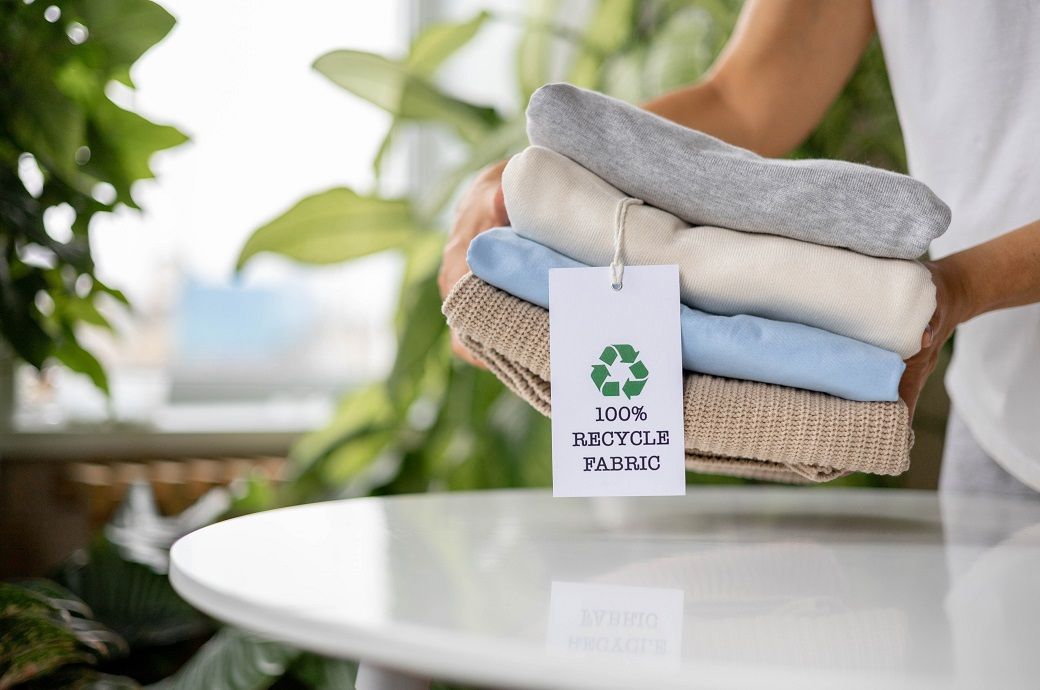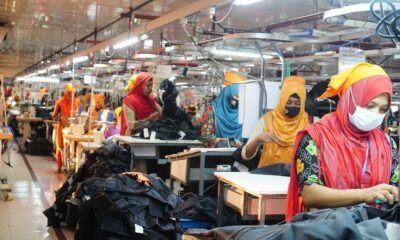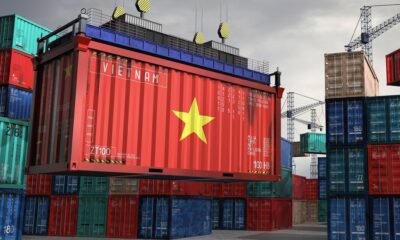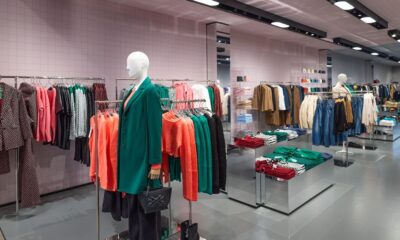Fashion
Cegid Retail refines its approach to the challenges of artificial intelligence for commerce

Published
September 14, 2025
Last year, Lyon-based management solutions specialist Cegid announced that it was bringing its Forward 2026 development strategy into line with generative artificial intelligence. Renamed Forward.ia, the development program continues, in particular for the Cegid Retail division, which is stepping up deployment and experimentation of retail solutions, while taking care not to fall into the trap of multiplying useless generative tools.
“Our approach has always been to make innovation useful and not to create gas factories that serve no one,” Nathalie Echinard, general manager of the retail division, tells FashionNetwork.com. “Nevertheless, we know that AI and generative AI will transform the business, both for our team internally and for our customers.”
Last year’s biennial Cegid Connections Retail event in Rome featured eight AI use cases anticipating the needs of commerce to 2030. Four have since been delivered. Starting with an enhancement to the Livestore checkout solution. This now enables a sales assistant to interact with customers with whom they do not share a common language, via a split screen.
The Cegid Retail Store Excellence tool, used for communication between a head office and its store network, has also been enhanced. “It can now translate and send messages to each store, for example to explain a new collection, in the case of fashion brands”, explained Echinard. The manager also points out that AI can now directly generate message bases or visuals to guide sales teams.
In the apparel business, these teams are subject to high turnover and have no time for training. In the past, Cegid has responded to this need with simplified dashboards that are easy to learn. But AI now enables the salesperson to exchange directly with the system verbally to explain their problem, so as to be guided through the task.
“We’re gradually moving towards an augmented sales assistant,” explained Echinard. “Augmented vis-à-vis the customer, but also in terms of efficiency and time optimization. Applications will help them to choose their priorities according to what’s happening in the store, but above all to navigate from one task to another without really realizing it.”

Personalization has not been forgotten. A tool, presented last year to Cegid’s partners, is currently being developed based on customer data and product recommendation learning. AI will reinforce the Livestore tool by helping the sales assistant to identify the needs of existing tastes and customers.
“This takes the form of a 6-8 word cloud that gives maximum information in a short space of time to the salesperson. After all, no one wants a sales assistant who remains immersed in the tablet”, explained the Cegid Retail manager.
A manager who also bears witness to the growing demands of brands in terms of security. Security breaches, cyber-attacks and data ransomware are on everyone’s mind. “When our customers are major players in the luxury goods and CAC40 sectors, we take this very seriously”, sais Echinard. She points out that, by contract, security updates are the only ones Cegid can launch to warn its customers.
“And, given what’s at stake, no brand has a problem with that,” said Echinard.
After the NRF (formerly Paris Retail Week) trade show, to be held in Paris from September 16 to 18, she will be preparing the 2026 edition of Cegid Connections Retail, to be held in Prague in the spring. Perhaps by then, the market will have taken a more rational look at AI.
“The enthusiasm it generates needs to stabilize, and everyone needs to stop going off in all directions,” concluded Echinard. She is mindful of the Gartner study which, last June, estimated that 40% of AI tools in development could be abandoned by 2027.
This article is an automatic translation.
Click here to read the original article.
Copyright © 2025 FashionNetwork.com All rights reserved.
Fashion
Indian textile players hail Budget’s ESG & circularity thrust

Industry stakeholders said the Budget signals a transition away from volume-driven growth towards a value-led, low-carbon and traceable textile ecosystem, supported by initiatives such as the Text-ECO initiative, the National Fibre Scheme, Samarth 2.0, and sustainability-linked capacity building.
Indian textile industry has welcomed the Budget for its strong focus on sustainability, circularity and responsible manufacturing.
Industry leaders said the measures signal a shift towards value-led, low-carbon and traceable growth.
Initiatives such as Text-ECO, Samarth 2.0 and the National Fibre Scheme are seen as strengthening competitiveness, skills and sustainable sourcing across the value chain.
Shruti Singh, Country Director–India at Canopy Planet, said, “This Budget creates enabling conditions for India to lead in manufacturing of low carbon textile fibres and paper packaging. Investing in circular material ecosystems can meet business ESG goals, create domestic fibre security and global export competitiveness,” she said. Singh added that as demand grows across textiles, packaging and paper-based applications, the real test will lie in responsible sourcing. “For companies linked to forest-based supply chains, this is a moment to strengthen traceability, reduce deforestation risk, and move sustainability from intent to execution,” she noted.
From a fashion brand perspective, Amar Nagaram, co-founder of Virgio, said the Budget clearly links sustainability with innovation and design-led growth. “India’s next phase of growth will be driven by the convergence of design, technology and sustainability. The emphasis on sustainable textiles, MSME scale-up, AI-led innovation and design education reflects a long-term vision to move Indian manufacturing up the global value chain,” he said. Nagaram added that the policy direction supports responsible production, data-driven decision-making, and positions India as a credible global hub for future-ready fashion and lifestyle businesses.
At the manufacturing end, Sabhari Girish, chief sustainability officer at Sulochana Cotton Spinning Mills, Tiruppur, said that sustainability and circularity receiving prominence in the Budget is encouraging for the sector. “Circularity and sustainability taking a prominent spot in the Budget speech is a positive signal. The announcement of Text-ECON will help Indian textile companies showcase their environmentally friendly contributions to the world,” he said. Girish noted that upcoming FTAs with the UK and EU are expected to sharpen the focus on sustainability, adding that Samarth 2.0 will play a critical role in skilling the workforce with updated technologies across the value chain, from fibre to garments.
He also pointed out that the National Fibre Scheme could enhance the quality and global competitiveness of Indian-made fibres, though capital-intensive modernisation will require a clear funding roadmap. “Adopting best practices needs more support, and a proper roadmap will help indigenous fibres take centre stage,” Girish said, while welcoming the proposal to upgrade sports goods manufacturing as a boost for R&D and technical textiles.
Industry experts said the Budget’s sustainability-led approach aligns closely with stricter environmental regulations in markets such as the EU and UK, and could strengthen India’s positioning as a responsible, compliant and future-ready sourcing destination.
Fibre2Fashion News Desk (KUL)
Fashion
US inks reciprocal trade agreement with Guatemala

“President Trump’s leadership is forging a new direction for trade that promotes partnership and prosperity in Latin America, further strengthening the American economy, supporting American workers, and protecting our national security interests,” said Ambassador Greer in a USTR release.
USTR Jamieson Greer and Guatemala’s Minister of Economy Adriana Gabriela Garcia recently signed the US-Guatemala Agreement on Reciprocal Trade.
The agreement addresses trade barriers facing American workers and producers, expands and solidifies markets for US exports and strengthens strategic economic ties in the Western Hemisphere, Greer said.
US trade body NCTO welcomed the signing.
The agreement addresses trade barriers facing American workers and producers, expands and solidifies markets for US exports and strengthens strategic economic ties in the Western Hemisphere, he said.
“This agreement builds on our long-standing trade relationship and shared interest in reinforcing regional supply chains,” he added.
The key terms of the agreement includes breaking down non-tariff barriers for US industrial and exports, advancing trade facilitation and sound regulatory practices; protecting and enforcing intellectual property; preventing barriers for digital trade; improving labour standards; strengthening environmental protection; strengthening economic security alignment; and confronting state-owned enterprises and subsidies.
Guatemala has committed to take steps to restrict access to central level procurement covered by its free trade agreement commitments for suppliers from non-free trade agreement partners, permitting exemptions as necessary, in a manner comparable to US procurement restrictions.
Welcoming the announcement, National Council of Textile Organizations (NCTO) president and chief executive officer Kim Glas said the agreement marks an important step toward strengthening the US textile supply chain.
“Guatemala is a key partner in the CAFTA-DR [Dominican Republic-Central America-United States Free Trade Agreement] region, with nearly $2 billion in two-way textile and apparel trade. Together, the region operates as an integrated co-production platform that is essential to the US textile supply chain,” he noted.
The US-Western Hemisphere textile and apparel supply chain remains ‘a critical strategic alternative’ to China and other Asian producers, he added.
Fibre2Fashion (DS)
Fashion
Canada could lift GDP 7% by easing internal trade barriers

Canada could boost long-term economic output by nearly 7 per cent if it dismantles policy-related barriers that restrict the movement of goods, services, and labour across provinces, according to new analysis by the International Monetary Fund (IMF).
Despite being one of the world’s most open economies globally, Canada’s internal market remains fragmented, with non-geographic barriers equivalent to an average 9 per cent tariff nationwide.
Canada could raise long-term GDP by nearly 7 per cent by removing internal trade barriers that restrict interprovincial movement of goods, services, and labour, new analysis shows.
Policy-related frictions act like a 9 per cent internal tariff nationwide.
Liberalising high-impact sectors could deliver productivity-led gains worth about C$210 billion (~$153.04 billion).
Model-based estimates suggest that fully removing these barriers could add around C$210 billion (~$153.04 billion) to real GDP over time, driven largely by productivity gains rather than short-term demand, IMF said in a release.
While full liberalisation will be gradual, targeted reforms in high-impact sectors could deliver sizable benefits and improve economic resilience. Analysts argue that stronger federal–provincial coordination, wider mutual recognition of standards and credentials, and transparent benchmarking of internal trade barriers will be key to turning Canada’s fragmented domestic market into a more integrated national economy.
Fibre2Fashion News Desk (HU)
-

 Sports6 days ago
Sports6 days agoPSL 11: Local players’ category renewals unveiled ahead of auction
-

 Entertainment6 days ago
Entertainment6 days agoClaire Danes reveals how she reacted to pregnancy at 44
-

 Business7 days ago
Business7 days agoBanking services disrupted as bank employees go on nationwide strike demanding five-day work week
-

 Sports6 days ago
Sports6 days agoCollege football’s top 100 games of the 2025 season
-

 Fashion1 week ago
Fashion1 week agoSpain’s apparel imports up 7.10% in Jan-Oct as sourcing realigns
-

 Sports6 days ago
Sports6 days agoTammy Abraham joins Aston Villa 1 day after Besiktas transfer
-

 Politics6 days ago
Politics6 days agoTrump vows to ‘de-escalate’ after Minneapolis shootings
-

 Entertainment6 days ago
Entertainment6 days agoK-Pop star Rosé to appear in special podcast before Grammy’s


















